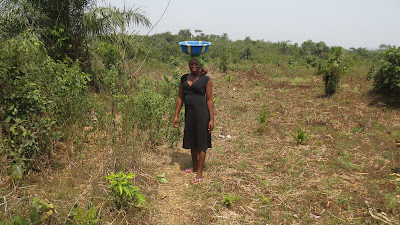When I left Liberia at the end of May, 2014, I had questions about what would become of the projects I had started and the people left behind. These included:
-A group of mainly illiterate women, called the Wolekamah Women's Organization. who wanted to build a community center where they and their children could learn to read and also to serve as a vocational training center to help women learn ways to support their families. My main goal was to help them become an NGO so they could apply for grants.
-"Dr. Nick's", the shop I had started
-The promises I made not to forget them and their aspirations for a better life
Other questions plagued me too:
-What had become people with whom I had become friends?
-What had become of the Cuttington University students who helped with a mentoring program and the health related programs at local primary and secondary schools?
-How did people cope during the Ebola crisis?
Somehow it is easy to explain going to a place like Liberia while a Peace Corps Volunteer. You are part of a greater program with the protection and services provided to employees of the U.S. Government. But on your own, you need to rely on Liberians to help you find a place to live, feed you, get your water, and assist you if you became injured or ill. Somehow now I had more faith in Liberians than the U.S. Government to watch my back. I think there was more at stake for my well-being with people I knew and trusted.
Yes, there is the dollar costs. It isn't cheap or easy to get to Liberia, but "What the hell". Off I went.
What people said upon seeing me again was that I was bigger (I weighed more this time) and looked younger. I guess that was not all bad.
To get some idea as to how the Liberian civil war affects society, you may want to connect to this article from Al Jazeera about two Liberian brothers, called "Children of War": http://projects.aljazeera.com/2016/02/liberia-child-war/
-A group of mainly illiterate women, called the Wolekamah Women's Organization. who wanted to build a community center where they and their children could learn to read and also to serve as a vocational training center to help women learn ways to support their families. My main goal was to help them become an NGO so they could apply for grants.
-"Dr. Nick's", the shop I had started
-The promises I made not to forget them and their aspirations for a better life
Other questions plagued me too:
-What had become people with whom I had become friends?
-What had become of the Cuttington University students who helped with a mentoring program and the health related programs at local primary and secondary schools?
-How did people cope during the Ebola crisis?
Somehow it is easy to explain going to a place like Liberia while a Peace Corps Volunteer. You are part of a greater program with the protection and services provided to employees of the U.S. Government. But on your own, you need to rely on Liberians to help you find a place to live, feed you, get your water, and assist you if you became injured or ill. Somehow now I had more faith in Liberians than the U.S. Government to watch my back. I think there was more at stake for my well-being with people I knew and trusted.
Yes, there is the dollar costs. It isn't cheap or easy to get to Liberia, but "What the hell". Off I went.
What people said upon seeing me again was that I was bigger (I weighed more this time) and looked younger. I guess that was not all bad.
To get some idea as to how the Liberian civil war affects society, you may want to connect to this article from Al Jazeera about two Liberian brothers, called "Children of War": http://projects.aljazeera.com/2016/02/liberia-child-war/

















































